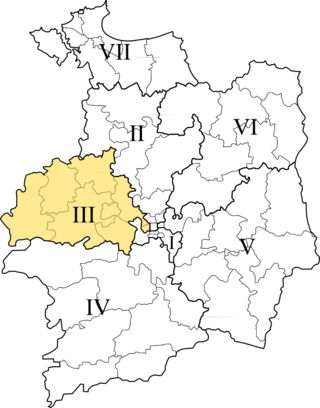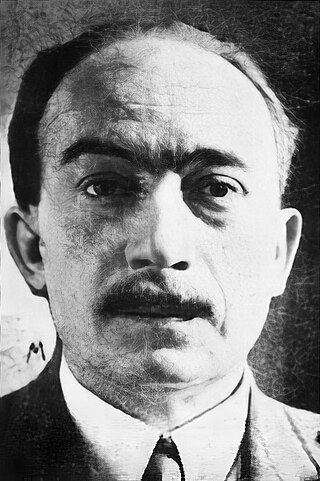 |
|---|
Partial general elections were held in Luxembourg on 9 June 1863, electing members of the Assembly of Estates. The elections took place in Luxembourg-City, Capellen, Diekirch, Grevenmacher, Redange, Clervaux, and Vianden. [1] [2] [3] [4]
 |
|---|
Partial general elections were held in Luxembourg on 9 June 1863, electing members of the Assembly of Estates. The elections took place in Luxembourg-City, Capellen, Diekirch, Grevenmacher, Redange, Clervaux, and Vianden. [1] [2] [3] [4]
Candidates who were successful are in bold.
Under the election system at the time, any second-round run-off votes took place on the same day as the first round.
| Canton | Seats | Affiliation | Candidate | First round | Second round |
|---|---|---|---|---|---|
| Votes | Votes | ||||
| Luxembourg-Ville | Liberal | Théodore Pescatore | 334 | ||
| Liberal | Auguste Fischer | 240 | |||
| Liberal | Charles André | 208 | |||
| Clerical | Charles Simonis | 174 | |||
| Nicolas Bodson | 129 | ||||
| Turnout | 376 | ||||
| Capellen | Liberal | Norbert Metz | 239 | ||
| Liberal | Jules Metz | 189 | |||
| Clerical | Risch | 105 | |||
| Turnout | 288 | ||||
| Diekirch | Liberal | De Blochausen | 233 | ||
| Tschiederer | 225 | ||||
| Liberal | E. Vannerus | 211 | |||
| Ulrich | 208 | ||||
| Angelsberg | 139 | ||||
| Schmit | 133 | ||||
| Turnout | 406 | ||||
| Grevenmacher | Liberal | Michel Fohl | 200 | ||
| Jean-Pierre Klein | 142 | ||||
| André | 136 | ||||
| Liberal | Ritter | 131 | |||
| Liberal | Putz | 118 | |||
| Turnout | n/a | ||||
| Redange | Liberal | Kellen | 243 | ||
| Jacques | 195 | ||||
| Liberal | Glesener | 150 | |||
| Turnout | n/a | ||||
| Clervaux | Toutsch | 136 | |||
| Arens | 136 | ||||
| Rischard | 76 | ||||
| Schiltz | 74 | ||||
| Turnout | n/a | ||||
| Vianden | Clerical | Sinner [a] | 29 | ||
| Clerical | Gödert | 15 | |||
| Clerical | Salner | 11 | |||
| Liberal | André | 5 | |||
| Turnout | n/a | ||||
The Grand Duchy of Luxembourg has long been a prominent supporter of European political and economic integration. In 1921, Luxembourg and Belgium formed the Belgium-Luxembourg Economic Union (BLEU) to create an inter-exchangeable currency and a common customs regime. Post-war, Luxembourg became a founding member state of the United Nations, and dropped its policy of neutrality to become a founding member state of NATO. Luxembourg expanded its support for European integration, becoming a founding member state of the Benelux Economic Union, and one of the "inner six" founding member states of the three European Communities; the European Coal and Steel Community (ECSC), the European Atomic Energy Community (Euratom), and the European Economic Community (EEC). Subsequently, Luxembourg became a founding member state of the European Union (EU) when the EEC and ECSC were incorporated into it in 1993. Luxembourg is a founding member of the Schengen Area, abolishing internal borders amongst its member states, named after the Luxembourg village where the original agreement — since incorporated into EU law — was signed in 1985. At the same time, the majority of Luxembourgers have consistently believed that European unity makes sense only in the context of a dynamic transatlantic relationship, and thus have traditionally pursued a pro-NATO, pro-US foreign policy.

Remich is a commune with town status in south-eastern Luxembourg with a population of 3,645 inhabitants as of 2018. It is situated in the canton of the same name. Remich lies on the left bank of the river Moselle, which forms part of the border between Luxembourg and Germany. The commune is the smallest in Luxembourg by surface area.
Same-sex marriage has been legal in Luxembourg since 1 January 2015. A bill for the legalisation of same-sex marriages was enacted by the Chamber of Deputies on 18 June 2014 and signed into law by Grand Duke Henri on 4 July. Polling suggests that a majority of Luxembourgers support the legal recognition of same-sex marriage. Luxembourg was the last Benelux country, the tenth in Europe and the sixteenth in the world to allow same-sex couples to marry nationwide.
Michel Rasquin was a Luxembourgish journalist and socialist politician, and European Commissioner.

The 3rd constituency of Ille-et-Vilaine is a French legislative constituency in the Ille-et-Vilaine département. Like the other 576 French constituencies, it elects one MP using the two-round system, with a run-off if no candidate receives over 50% of the vote in the first round.

Émile Mireaux was a French economist, journalist, politician and literary historian. In the 1930s, he edited Le Temps and contributed to other right-leaning journals. He became a senator in 1936, and briefly served as a minister in 1940. From 1940 until his death, he held a chair in political economy, statistics and finance at the Académie des Sciences Morales et Politiques.
Partial general elections were held in Luxembourg on Thursday 17 September 1857, electing members of the Assembly of Estates.
Partial general elections were held in Luxembourg on 10 June 1851, electing members of the Chamber of Deputies.
General elections were held in Luxembourg on 14 June 1854, electing members of the Chamber of Deputies from all the cantons of Luxembourg.
Partial general elections were held in Luxembourg on 30 July 1860, electing 15 members of the Assembly of Estates. The elections took place in Echternach, Esch-sur-Alzette, Grevenmacher, Luxembourg-Campagne, Mersch, Redange, Remich, and Wiltz.
Partial general elections were held in Luxembourg on 14 June 1881, electing members of the Chamber of Deputies. The elections took place in Capellen, Clervaux, Diekirch, Esch-sur-Alzette, Grevenmacher, Luxembourg-Ville, Redange, and Vianden.
Partial general elections were held in Luxembourg on 11 June 1878, electing members of the Chamber of Deputies. The elections took place in Echternach, Esch-sur-Alzette, Luxembourg-Campagne, Mersch, Remich, and Wiltz.
Partial general elections were held in Luxembourg on 9 June 1875, electing members of the Chamber of Deputies. The elections took place in Capellen, Clervaux, Diekirch, Grevenmacher, Luxembourg City, Redange, and Vianden.
Partial general elections were held in Luxembourg on 11 June 1872, electing members of the Chamber of Deputies. The elections took place in Echternach, Esch-sur-Alzette, Luxembourg-Campagne, Mersch, Remich, and Wiltz.
Partial general elections were held in Luxembourg on 8 June 1869, electing 20 members of the Chamber of Deputies. The elections took place in Capellen, Clervaux, Diekirch, Grevenmacher, Luxembourg City, Redange, and Vianden.
Partial general elections were held in Luxembourg on 12 June 1866, electing members of the Assembly of Estates. The elections took place in Luxembourg-Campagne, Esch-sur-Alzette, Echternach, Mersch, Remich, and Wiltz.

The Courrier du Grand-Duché de Luxembourg was a French-language newspaper in Luxembourg published from 1844 to 1868.
Partial general elections were held in Luxembourg on 17 December 1868, electing members of the Chamber of Deputies. The elections took place in Capellen, Clervaux, Diekirch, Echternach, Luxembourg-Campagne, Mersch, Redange, Remich.
Partial general elections were held in Luxembourg in May 1845, electing members of the Assembly of Estates.